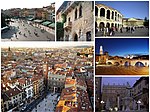Teatro Filarmonico
1716 establishments in Italy1754 establishments in the Republic of Venice18th-century architecture in ItalyBuildings and structures in VeronaMusic venues completed in 1716 ... and 9 more
Music venues completed in 1754Music venues completed in 1975Opera houses in ItalyOpera structure stubsTheatres completed in 1716Theatres completed in 1754Theatres completed in 1975Theatres in VenetoTourist attractions in Verona

The Teatro Filarmonico is the main opera theater in Verona, Italy, and is one of the leading opera houses in Europe. The Teatro Filarmonico is property of the Accademia Filarmonica di Verona. Having been built in 1716, and later rebuilt after a fire of January 21, 1749, and again after the allied bombing of February 23, 1945.
Excerpt from the Wikipedia article Teatro Filarmonico (License: CC BY-SA 3.0, Authors, Images).Teatro Filarmonico
Via dei Mutilati, Verona San Zeno
Geographical coordinates (GPS) Address Nearby Places Show on map
Geographical coordinates (GPS)
| Latitude | Longitude |
|---|---|
| N 45.438055555556 ° | E 10.99 ° |
Address
Associazione Nazionale Mutilati ed Invalidi di Guerra
Via dei Mutilati 8
37122 Verona, San Zeno
Veneto, Italy
Open on Google Maps









